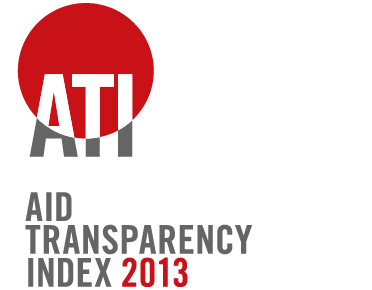Germany
AID TRANSPARENCY ANALYSIS
The 2013 ATI takes into account the development cooperation policy-setting and leadership role of the Federal Ministry for Economic Cooperation and Development (Bundesministerium für wirtschaftliche Zusammenarbeit und Entwicklung – BMZ). BMZ is responsible for publishing to IATI, including the activities of the two principal implementing agencies for bilateral cooperation: the Deutsche Gesellschaft für Internationale Zusammenarbeit (GIZ); and the KfW Entwicklungsbank, Germany’s main development finance institution. Therefore, joint assessments – BMZ-GIZ and BMZ-KfW – were conducted.[1]
In addition, the German Foreign Office (Auswärtiges Amt – AA) is included in the Index for the first time, recognising its important role in German aid spending – especially on humanitarian aid. Several other ministries, agencies, federal states (Länder) and municipalities are also responsible for smaller amounts of development cooperation. The BMU is responsible for a significant and growing amount of aid spending, through the largely ODA-eligible International Climate Initiative; however, it has not yet been explicitly mentioned in Germany’s common standard implementation schedule.
- In June 2013, all G8 countries reaffirmed their commitment to implement the Busan common standard, including both IATI and the DAC Creditor Reporting System by 2015.
- Implementation of Germany’s IATI commitment was delayed by institutional changes (the merger of several technical cooperation agencies into GIZ) and the development of the MEMFIS system, which is designed to streamline information sharing within BMZ and between BMZ, GIZ and KfW.
- BMZ began publishing to IATI in March 2013, focusing first on BMZ-funded projects implemented by GIZ, KfW, PTB and BGR. A significant amount of the Index data collected for GIZ and KfW was found in the IATI format this year.
- IATI is mentioned in BMZ’s anti-corruption strategy as a means of improving access to information on development funds.
- Germany was a founding signatory to IATI and published an implementation schedule in December 2012, in accordance with the Busan deadline. The schedule covers (in some cases partially) information from GIZ, KfW and two smaller organisations, Physikalisch-Technische Bundesanstalt (PTB) and Bundesanstalt für Geowissenschaften und Rohstoffe (BGR); publication is led by BMZ, which provides organisation-level information. Publication will include other ministries, including the Foreign Office, in 2014 or 2015.
- The Federal Ministry of the Interior has launched a government data platform, govdata.de; approximately 80% is open data but does not yet include IATI data.
Germany’s performance is mixed, with BMZ-GIZ and BMZ-KfW both placed in the fair category, while the Foreign Office is in the very poor category. The average score for the German agencies (33.2%) is just above the Index average of 32.6%. There is a significant difference between the amount of information currently published by BMZ and the Foreign Office. While BMZ has started publishing traditional CRS reporting fields to IATI for GIZ and KfW, current information on the Foreign Office’s aid activities is yet to be published in any machine-readable format. The BMZ, GIZ and KfW websites also contain a lot more information than the Foreign Office’s currently does. There are six indicators for which none of the German organisations score, including budget documents, conditions, impact appraisals and sub-national location.
[1] The 2011 Pilot Index and the 2012 Index assessed the aid transparency of only GIZ and KfW, while including information for both that was published by BMZ.
RECOMMENDATIONS
- All of Germany’s aid-spending ministries, agencies and federal states should cooperate with BMZ to extend the coverage of German development cooperation published to IATI, so it is comprehensive.
- Germany should promote access and use of its IATI information via an open data portal.
- Germany should consider joining OGP, which currently includes 17 EU Member States. This would be an opportunity to share best practice in open data and open government approaches with peers in the EU and with partners who receive German aid.
